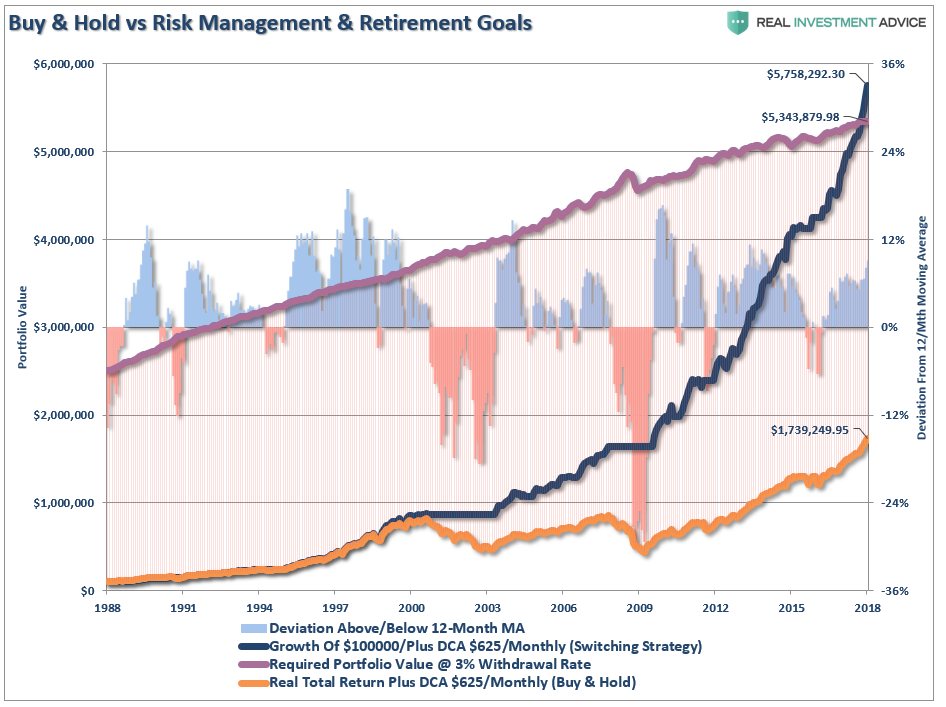
Individuals are consistently promised that investing in the financial markets is the only way to financial success. After all, it’s so easy. Financial pundits across the country consistently promote the myth that one simply buys a basket of ETF’s, or individual stocks, and returns will compound at 8, 10 or 12% a year.
Nothing could be further from the truth.
On a nominal basis, it is true that if one bought an index, and held it for 20-years, they would have most likely made money. Unfortunately, making money, and reaching financial goals, are two ENTIRELY different things.
“The chart below shows the difference between two identical accounts. Each started at $100,000, each had $625/month in additions and both were adjusted for inflation and total returns. The purple line shows the amount of money required, inflation-adjusted, to provide a $75,000 per year income to Bob at a 3% yield. The only difference between the two accounts is that one went to “cash” when the S&P 500 broke the 12-month moving average in order to avoid major losses of capital.”

For the majority of Americans, investing has never worked as promised.
The problem, as I have discussed many times previously, is that most individuals cannot manage their own money because of ‘short-termism.’
Despite their inherent belief that they are long-term investors, they are consistently swept up in the short-term movements of the market. Of course, with the media and Wall Street pushing the ‘you are missing it’ mantra as the market rises – who can really blame the average investor ‘panic’ buying market tops and selling out at market bottoms.”
Sy Harding summed this point up in his excellent book “Riding The Bear:”
“No such creature as a buy and hold investor ever emerged from the other side of the subsequent bear market.”
Statistics compiled by Ned Davis Research back up Harding’s assertion. Every time the market declines more than 10% (and “real” bear markets don’t even officially begin until the decline is 20%), mutual funds experienced net outflows of investor money. Fear is a stronger emotion than greed.
The research shows that it doesn’t matter if the bear market lasts less than 3 months (like the 1990 bear) or less than 3 days (like the 1987 bear). People will still sell out, usually at the very bottom, and almost always at a loss.
The only way to avoid the “buy high/sell low” syndrome – is to avoid owning stocks during bear markets. If you try to ride a bear market out, odds are you’ll fail.
And if you believe that we are in a new era where Central Bankers have eliminated bear market cycles, your next of kin will have my sympathies.
Let’s look at some of the more common trading mistakes to which people are prone. Over the years, I’ve committed every sin on the list at least once and still do on occasion. Why? Because I am human too.
1) Refusing To Take A Loss – Until The Loss Takes You.
When you buy a stock it should be with the expectation that it will go up – otherwise, why would you buy it?. If it goes down instead, you’ve made a mistake in your analysis. Either you’re early, or just plain wrong. It amounts to the same thing.
There is no shame in being wrong, only in STAYING wrong.
This goes to the heart of the familiar adage: “let winners run, cut losers short.”









Leave A Comment